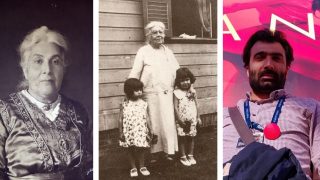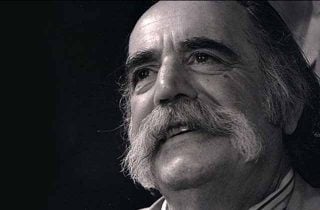“Shahane You My Shahane…” Who was Yesenin’s Love Shahane Talyan?
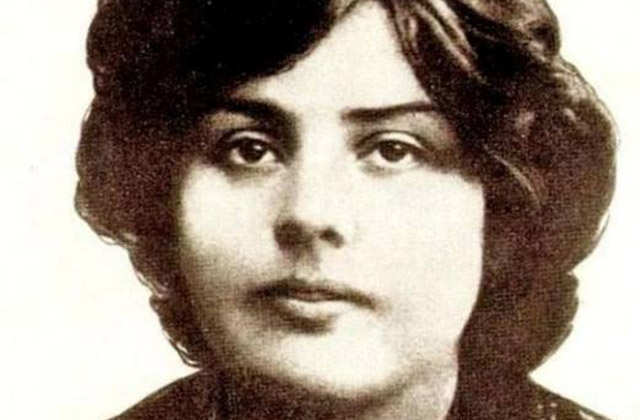
Shahane (Shahandukht) Talyan’s biography:
“I was born on 22 April of 1900, in Akhaltsikhe. My father was a linguist first, and after my pastor grandfather’s death, he becomes a pastor. My father—Nerses Hambardzumyan, has graduated from Tbilisi seminary. He knew French, German, Latin, Russian and Armenian. He was also conducting private language classes. My father died of typhus when he was 50 (1919).
My mother, Maria Karakashyan was a teacher. She died at 40 (1911). Until the third grade I studied at Parochial school in Akhaltsikhe, then in women’s gymnasium in Khashuri. After leaving the gymnasium, I participated in teacher’s training course and in 1920, after accomplishment I had zero(starter’s) classes in Armenian school. In 1921 I got married to economist Stepan Terteryan and lived in Tbilisi. My son Ruben was born in 1921 (later on-PhD in medical sciences). I became a widow in 1924 and moved to Batumi, where I taught arithmetic in 4-5-6 grades and also a conductor of a zero class. In the period of 1925-26 I worked at Armenian school in Sochi, and throughout 1926-34-in school N70 in Tbilisi. For the second time I got married in 1930, to composer Vardges Talyan, then moved to Yerevan in 1934 and stopped working.
Shahane Talyan
3 February 1959, Yerevan.”
Shahane Talyan’s memories:
“One day in December 1924 I left the school and was on my way to home. I noticed a young man in the corner, who was a bit tall, stout, with fair hair, had a delicate hat on, and on his gray jacket had a mackintosh. His unusual appearance attached my attention and I thought he came from the capital.

…I was renting an apartment in Batumi with my sister-Katya, who was 23 and also was a teacher. Our neighbor was Yelizaveta Ioffe, a massage therapist, who was in close ties particularly with Katya. She knew reporter Povitski.
On the same day Ioffe rushed into our room saying, “Katya, famous Russian poet wants to get acquainted with our Shahane.” Yesenin and Povitski were in good ties then. And we went. Ioffe’s room was a bit tiny for us and the guests. After getting to know each other I invited them for a walk.
I can’t remember any other details from this first meeting. The next day, Yesenin and Povitski again visited us and invited to participate in a literary evening, where we could meet their acquaintances. The evening was to be held in Povitski’s apartment, where lived Yesenin as well. We decided to go.
…the next day, on my way home I saw him in the same corner.
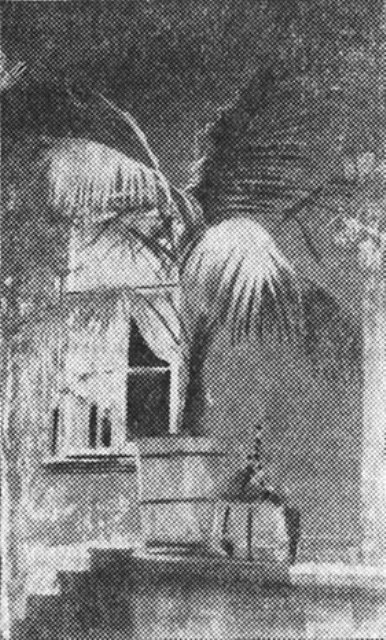
It was cloudy, and the sea was troubling. We greeted one another and Yesenin proposed to quickly cross the street, saying he didn’t like such weather, and that it would be better if he read poems for me. He read “Shahane you my Shahane…” and gave me 2 checkered notebook sheets, on which the poem was written. Under the poem it was written—S.Yesenin.
Yesenin also read another two poems, which he said had been written in Tbilisi (“My life”, “Today I asked the money-changer…”). Of course I asked him who Lala was. He replied, that she’s a fictitious character. At that time I didn’t believe, but after some years I understood he was right.
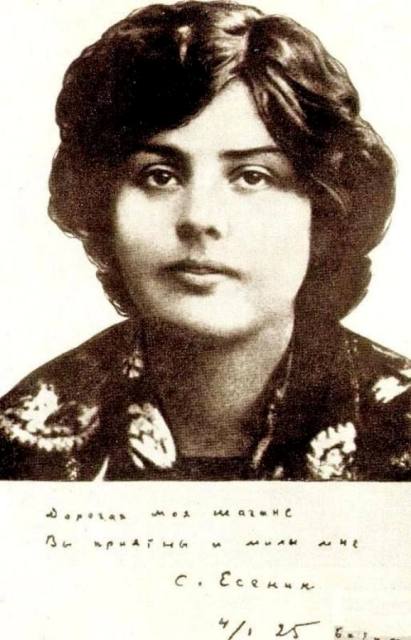
During one of our meetings, which were happening almost every day, he read a new poem- “You said, that Saadi…”
…when Yesenin noticed me in company of other men, for instance, my teacher colleagues, he was getting acquainted with them, and leaving only with me.
He was always coming with flowers, sometimes with roses, but more often with violets. He adored flowers.
On January 4 he gave me the book of his poems “Tavern Moscow” (Leningrad, 1924), which was signed, and on the cover it was written with a pencil: “My dear Shahane, you are pleasant and nice to me.”
Yesenin was interested in our national poetry. The neighbors had “Collection of Armenian poems” with V.Brusov’s translation, and Sergey, while visiting us, was often asking to bring the book and was reading it. He particularly admired Y.Charents, and learning that he’d come to Batumi soon, was looking forward to seeing him, and was often asking, “Any news? Hasn’t your Charents arrived yet?” however, Charents came to Batumi after Yesenin left for Moscow.
Yesenin was kind and conscientious. At those time homeless children were quite many, and he never ignored any of them—he was stopping them, asking where did they come from, how they lived, and was giving money. At those moments he was remembering his childhood. Once, noticing homeless boys, Yesenin said: “Look Shahane, you can see Pushkin, Lermontov, and me there.”
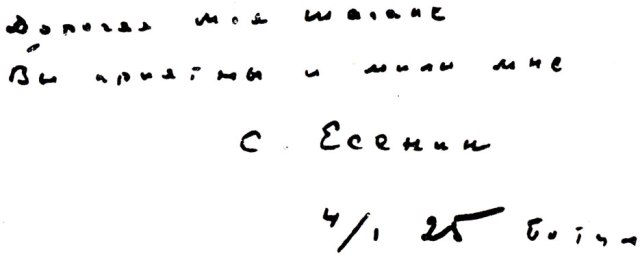
It was a snowy day in the end of December, which is quite rare in Batumi. The next day Yesenin visited us with a sleigh, he was happy, zealous, and we went on sleighing. It was the first time for us, and maybe Yesenin wanted to show me and my sister all charm of sleighing. On halfway he apologized, and asked to ride a horse. He was laughing while riding, and was happy like a child. Then he said he loved horses, their smell.
He really loved animals. If he noticed a street dog, he was buying food for it and feeding it. At that moment his eyes were turning more careful and kinder.
Sergei Aleksandrovich liked visiting us at evening hours, drink tea with tangerine jam, which he loved. When I was sending him to write poems, he would say he worked hard and was having rest then. When he saw me in the street, he would come to our place for sure.
As a memory, he took one of my photos, which he chose for himself. It was a photo of 1919, where I was in gymnasium uniform. I left a signature on the other side of the picture.
Next time he said he was going to publish “Persian motives,” and my photo will find its place there. I asked him not to do it, as his poems were brilliant and my photo wouldn’t change anything.
On the day before he left, he came and said he was departing. He mentioned he’d never forget me, tenderly said goodbye to me, but refused me or my sister to see him off. I didn’t receive any letters from him. S.A.Yesenin is and will be the bright memory of my life.
Shahane Talyan
1959, Yerevan.”
By Razmik Martirosyan









